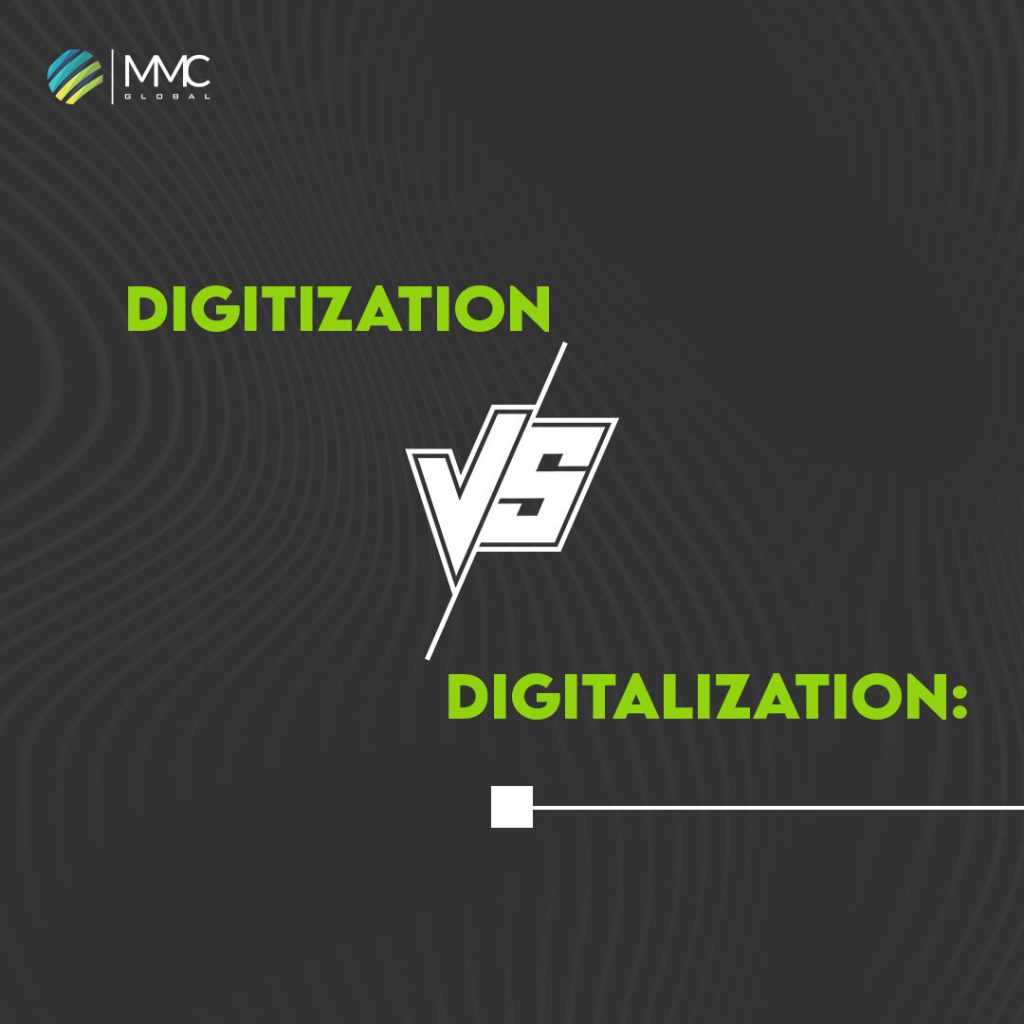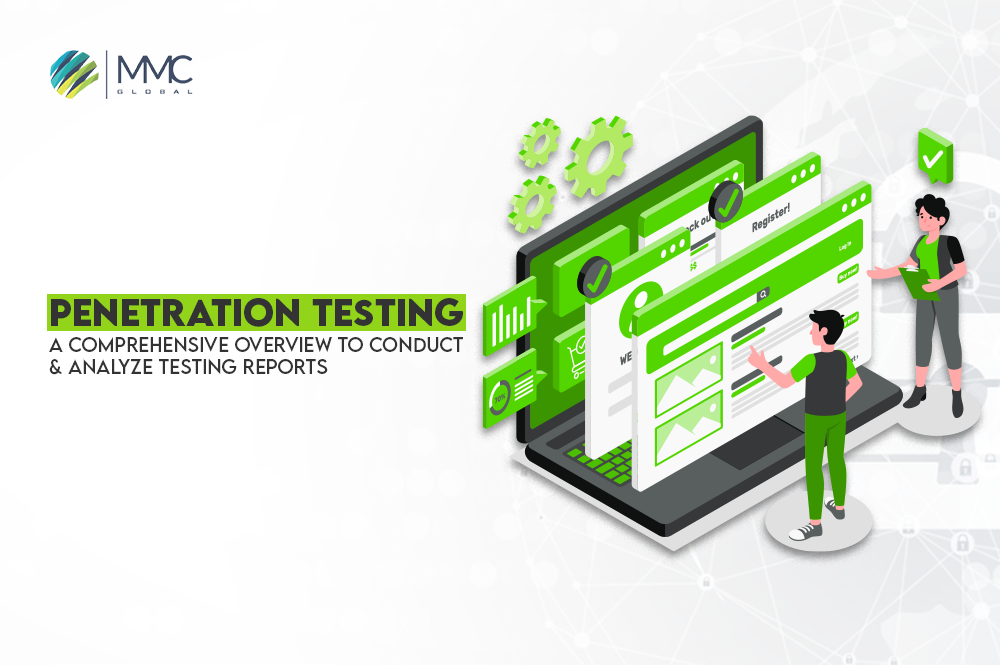In today’s rapidly evolving business landscape, corporations face the challenge of adapting to the digital revolution to stay competitive. “digital transformation” and “digitization” represent distinct concepts with different implications for businesses. We will explore the difference between digital transformation and digitization and their significance for organizations across industries.
Digital transformation solutions involve reshaping business models, streamlining processes, and enhancing customer experiences. Digital business transformation is a strategic initiative enabling businesses to stay relevant, improve operational efficiency, and deliver superior value to customers. It encompasses various areas, including technology adoption, cultural shifts, and process optimization.
Assist Organizations in Defining their Transformation Roadmap
Organizations often seek the assistance of digital transformation services to navigate the complexities of digital transformation. These services provide expertise, guidance, and resources to help organizations navigate the transformation journey. Digital transformation services providers offer a variety of solutions, facilitating the integration of digital technologies into existing operations. They assist organizations in defining their transformation roadmap, identifying improvement areas, and developing strategies for successful implementation.
A well-defined digital transformation strategy is crucial for organizations embarking on the journey. This strategy involves a comprehensive evaluation of existing processes, identifying key areas for improvement, and the formulation of a roadmap for implementation. It considers the organization’s goals, industry trends, and the technological landscape to create a robust plan that drives innovation and maximizes returns on investment. A carefully crafted digital transformation strategy ensures that the transformation efforts align with the organization’s long-term vision.
Digital transformation solutions encompass various technologies, tools, and platforms enabling organizations to achieve their objectives. These solutions include cloud computing, artificial intelligence, big data analytics, the Internet of Things (IoT), and more. By integrating these technologies into their operations, businesses can automate their processes. To gain valuable insights, improve decision-making capabilities, and enhance overall productivity. Digital transformation solutions are often customizable to meet specific business requirements, allowing organizations to create tailored solutions that address their unique challenges.

Role Of Custom Software Development in Digital Business Transformation
Software development plays a crucial role in digital business transformation initiatives. Custom software development is particularly valuable, allowing organizations to develop software applications to address their unique challenges and requirements. Off-the-shelf software may only sometimes meet the complex needs of businesses undergoing digital transformation. Custom software development ensures the solutions implemented align perfectly with the organization’s goals, workflows, and integration requirements.
In digital transformation, custom mobile app development is also essential. In an increasingly mobile-centric world, mobile apps enable organizations to connect seamlessly with their customers, employees, and partners. Custom mobile apps enhance user experience, improve accessibility, and provide personalized experiences. They significantly enhance customer engagement, streamline internal processes, and support digital business transformation efforts.
IT consultancy services also play a vital role in guiding organizations through the digital landscape. IT consultants provide expertise, advice, and recommendations on technology adoption, digital strategies, and implementation best practices. They help organizations make informed decisions about technology investments, navigate the complexities of digital transformation, and align their IT infrastructure with their business goals. IT consultancy services ensure organizations stay updated with the latest technological advancements and leverage them effectively to drive success in digital transformation.
Digital transformation services involve a cultural shift within the organization, embracing new mindsets and working methods. It requires organizations to reimagine their business models, identify opportunities for disruption, and actively seek ways to create value in the digital economy. It is an ongoing process that requires continuous adaptation and evolution as technology and customer expectations change.
Read more: Digital Business Transformation: The Key to Future Success
Importance Of Digital Transformation In Digitization
Digitization focuses on converting analog information into digital formats. It involves using technology to automate processes, digitize documents, and improve data management. Digitization allows for increased efficiency, better access to information, and enhanced collaboration. It is a more tactical and transactional process than digital transformation.
While digitization can provide immediate benefits such as cost savings and process optimization, digital business transformation offers a broader and more profound impact on the organization. It involves a strategic vision and a long-term commitment to leveraging digital technologies to drive innovation, create new business models, and deliver enhanced customer value.
Digital transformation solutions require a well-defined strategy that aligns with the organization’s goals and objectives. This strategy should consider the organization’s industry, market trends, customer preferences, and technological advancements. It should also consider the organization’s internal capabilities and resources to ensure a realistic and achievable transformation journey.
Digital transformation solutions encompass various technologies and tools organizations can leverage to achieve their objectives. Cloud computing enables organizations to access scalable and flexible infrastructure, while artificial intelligence and big data analytics provide insights and automation capabilities. The Internet of Things (IoT) allows for the connectivity and integration of physical devices, and blockchain offers secure and transparent transactions.
Custom software development plays a crucial role in digital business transformation by enabling organizations to develop software solutions tailored to their specific needs. Off-the-shelf software may need more flexibility and customization for organizations undergoing digital transformation. Custom software development allows organizations to align their software solutions with unique business processes, integration requirements, and customer experiences.
IT consultancy services are critical in supporting organizations through their digital business transformation journey. IT consultants provide expertise, guidance, and support in technology strategy, architecture design, project management, and change management. They help organizations navigate the complexities of digital transformation, identify the right technologies and solutions, and ensure successful implementation and adoption.

Certainly! Let’s dive deeper into digital transformation solutions and digitization by exploring relevant statistics highlighting their significance and impact on businesses.
Digital Business Transformation Statistics
According to IDC, worldwide spending on digital transformation services is expected to reach $2.3 trillion in 2023, indicating the increasing investment organizations make in this area.
A survey by McKinsey found that 92% of senior executives consider digital business transformation essential to their organization’s long-term success.
In a PwC survey, 61% of CEOs stated that digital transformation solutions efforts have helped increase revenue.
According to MIT Sloan Management Review research, 72% of successful organizations in their digital transformation efforts outperform their competitors.
Digitization Statistics
In a report by Accenture, 70% of companies believe that digitization will help them achieve operational excellence and reduce costs.
- The World Economic Forum estimated that digitization could unlock $100 trillion in value for businesses and society over the next decade
- A study by McKinsey found that digitizing paper-based processes can lead to 50-75% productivity gains
- According to Statista, the global digital document management market is expected to reach $10.17 billion by 2025, indicating the growing adoption of digitization solutions
These statistics show the growing importance of digital business transformation and digitization for businesses. Organizations across industries recognize the potential benefits and invest in these initiatives to drive innovation, enhance customer experiences, and stay competitive in the digital age.
Digital transformation solutions enable organizations to embrace new technologies and business models to transform their operations and create value. It helps organizations improve efficiency, optimize processes, and unlock new revenue streams. The statistics show that organizations that successfully implement digital business transformation initiatives often outperform their competitors and achieve higher revenue growth.
On the other hand, digitization focuses on converting analog processes and information into digital formats. It allows organizations to streamline operations, improve data management, and enhance collaboration. Digitization can lead to significant cost savings, increased productivity, and improved decision-making capabilities. Together, digital transformation solutions and digitization are powerful forces that drive organizational growth and success in the digital era. Organizations can effectively implement these initiatives by leveraging custom software development and IT consultancy services and aligning their technology solutions with their business needs.
Here Are Some Key Points On Digital Transformation Services And Digitization
Industries Embracing Digital Transformation
Various industries are adopting digital transformation strategy to drive innovation and meet evolving customer expectations. For instance, the healthcare sector is leveraging digital technologies to enhance patient care through telemedicine, electronic health records, and remote monitoring. The retail industry uses digital transformation solutions to create personalized shopping experiences, improve inventory management, and enable seamless omnichannel sales. Similarly, manufacturing companies are implementing smart factory solutions powered by IoT, automation, and data analytics to reduce production processes and improve supply chain efficiency.
Role of Data in Digital Transformation
Data plays a crucial role in digital business transformation initiatives. Organizations leverage big data analytics to gain valuable insights, identify patterns, and make data-driven decisions. By harnessing data from various sources, including customer interactions, operational processes, and market trends, organizations can enhance their understanding of their business and customers, leading to more targeted strategies and improved decision-making.
Challenges in Digital Transformation
While digital transformation solutions offer numerous benefits, organizations face challenges. Some common hurdles include legacy systems and infrastructure that hinder technology integration, employee resistance to change, and cybersecurity risks associated with increased digital connectivity to adapt to new technologies. Overcoming these challenges requires careful planning, effective change management, and collaboration across different departments and stakeholders.
Impact of Digitization on Customer Experience
Digitization has revolutionized the customer experience by providing convenience, personalization, and seamless interactions. Customers now expect businesses to offer digital channels for communication and transactions, such as mobile apps, self-service portals, and chatbots. Digitization enables organizations to gather customer data, analyze preferences, and deliver tailored experiences that meet individual needs. This focus on customer-centricity drives customer loyalty, satisfaction, and business growth.
Importance of Agile Software Development
Agile software development methodologies, such as Scrum and Kanban, play a vital role in digital transformation services initiatives. These methodologies prioritize flexibility, collaboration, and iterative development, allowing organizations to respond quickly to changing requirements and market demands. Agile development enables organizations to deliver software solutions more efficiently, adapt to evolving customer needs, and continuously improve their products and services.
Benefits of IT Consultancy Services
IT consultancy services provide organizations with expert guidance and support throughout the digital business transformation journey. Consultants bring industry knowledge, technological expertise, and best practices to help organizations identify strategic opportunities, assess technology options, and develop a roadmap for successful digital transformation solutions. They can also assist with vendor selection, project management, and change management to ensure smooth implementation and adoption of digital solutions.
Digital transformation and digitization reshape the business landscape and revolutionize organizations’ operations. By embracing these concepts and leveraging software development, custom mobile app development, and IT consultancy services, businesses can navigate the digital landscape, unlock new opportunities, and drive sustainable growth in the digital age.
Conclusion
While digitization is a necessary component of digital transformation, more is needed. Digital Business transformation encompasses a broader and more strategic approach to leveraging digital technologies to drive organizational change and innovation.
It involves a cultural shift, business model transformation, and a holistic view of how technology can create value. Custom software and mobile app development services are integral to the digital transformation strategy journey. This enables organizations to align technology solutions with their unique business needs and drive successful transformation outcomes.





